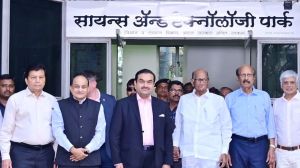Ten, nine, eight8230; Space!
Two recent events have a direct bearing on the commercialisation of space travel. Virgin Groups8217; chief Sir Richard Branson announced th...

Two recent events have a direct bearing on the commercialisation of space travel. Virgin Groups8217; chief Sir Richard Branson announced that his company has signed an agreement worth 14 million pounds to secure the first commercial flights into space. The cost of one ticket is expected to be around one lakh pounds.
In a related development on September 29 the SpaceShipOne rocket plane piloted by Mike Melvill crossed the 100 km boundary above the earth surface and landed back safely. It did it again for the second time in a week, over the Majav desert, California. These test flights were undertaken by Mojave Aerospace Ventures. The Virgin chief has tied up with the same concern for his proposed 8216;Virgin Galactic8217;.
Aerospace pioneer Burt Rutan built this SpaceShipOne spacecraft and the entire project is funded by Microsoft co-founder Paul Allen. The cost of the project is an estimated US20 million. In 1986 Rutan developed Voyager, the aircraft that became the first to go around the world without refueling. SpaceShipOne missions are keyed to winning the Ansari X Prize, a 10 million purse offered by the X Prize Foundation of St Louis, Missouri. The prize money is to be awarded to the first organisation to launch a vehicle capable of carrying three people to a height of 62.5 miles 100 kilometers, then return to Earth, and repeat the flight in the same vehicle within two weeks. As per NASA standards, any individual touching 50 miles 270,000 feet approximately in altitude is eligible to become an astronaut.
SpaceShipOne flights have proved that you don8217;t have to be in NASA or a government organisation to reach outer space. The proposed investments by flamboyant players like Branson indicate that space tourism could be a reality soon.
Developments in space technologies have mostly been military-centric. Man reached the moon because of his quest for ballistic missile technology and the geopolitical requirement of starting the space race. The concept of hiring private security organisations for military purposes was unheard of till the Iraq war. In years to come, countries may even opt for 8216;8216;space agents8217;8217; from private commercial organisations to create hindrance to the enemy countries8217; satellite constellations. This could be the ultimate outsourcing of security.
- 01
- 02
- 03
- 04
- 05































